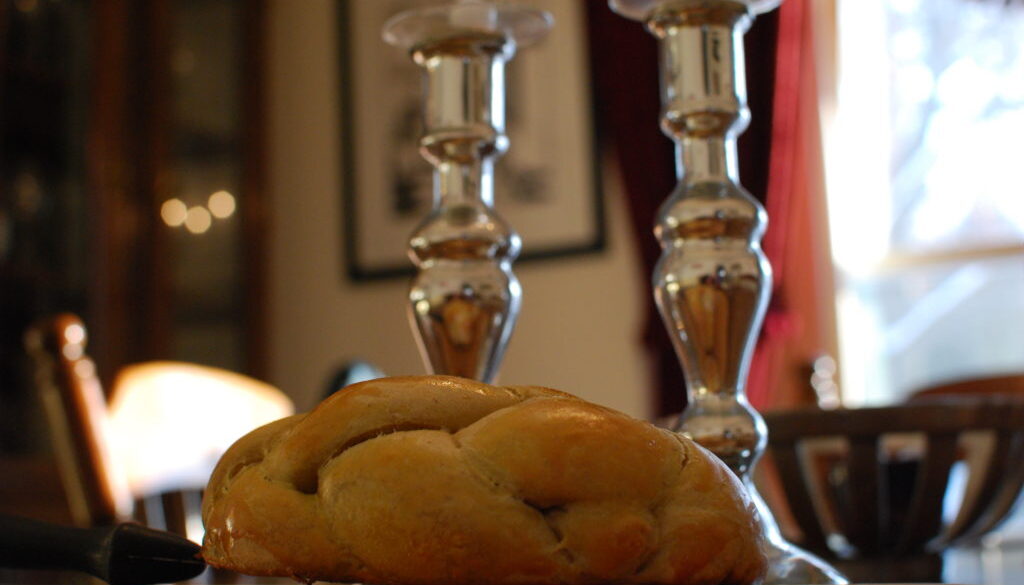Permission to Stop
“The laws of Shabbat”, the Rabbis of the Mishnah admitted, “are like a mountain hanging by a hair.”
The Rabbis were self-aware enough to know that the ‘avot melacha’, the 39 categories of forbidden work, were tenuous at best. While the Torah commands us to rest on the seventh day, it doesn’t go into too much detail. Yes, the Torah tells us clearly not to gather or carry on the Sabbath, and prohibits us from making fire, but the specifics are left to the rabbinic imagination of the Oral Law. The Rabbis intuited that in order for Shabbat to be experienced in its fullness, structures are needed: just as ‘zachor’ is important, so is ‘shamor’ – the Ten Commandments tell us to both ‘remember’ and ‘observe’ the Sabbath day.
So, the Rabbis went in search of proof. They wanted to demonstrate, from the Torah – ‘mi’d’Oraita’ – that the laws of Shabbat were immutable and divine. According to the Talmud (tractate Shabbat 49a) the proof is found in a juxtaposition of the construction of the Tabernacle and the commandment to observe Shabbat. They argued that the intersection and symbolism of these two texts had something very profound to say about both how and why we observe Shabbat.
To the Rabbis, the argument wasn’t merely pragmatic. While it is true that the rabbinic categories of work are derived from the categories of craftsmanship needed to build the Tabernacle, this is not to be taken at face-value. Yes, dyeing, tearing, shearing, sowing, planting, lighting a fire and ‘the last hammer blow’ are some of those categories which relate immediately to such a building project in the ancient pre-Industrial world. But it wasn’t just about creating boundaries to refrain from doing certain things: it was about recognizing the symbolic importance of the Mishkan, the Tabernacle. The Tabernacle, built with ‘giving hearts’ and ‘hearts of wisdom’ represents the axis mundi, the world pole, the navel of the Cosmos. It was a microcosm of the Divine made manifest in our world – a way for the Israelite worshiper to maintain the cosmic order and find sanctification and meaning in it. This is made exemplary by the word often used to describe the work of the building of the Tabernacle: ‘melacha’. ‘Melacha’ is the same term that Genesis uses when describing the work of Creation: it is God Who engages in the ‘melacha’ of creating the beautiful, bounteous world we are part of. There is another connection: just like we sing at the Friday night Kiddush, ‘vayechulu hashamayim v’ha’aretz’ – ‘the heavens and earth were completed’, the same verb is used in our Parashah this week when the Mishkan is completed: ‘V’techel kol avodat mishkan…’ – ‘Thus was completed all the work of the Tabernacle.’ (Ex. 39:32). Even more remarkable is the following parallel: just as God blessed the products of God’s creation, so to does Moses bless the workers of the Tabernacle when they complete their magnificent project: ‘vayevarech otam Moshe’.
Two thousand years after the Rabbis decided to suspend the Sabbath laws by a hair, the consequences of their exegesis still loom large. Certainly in the Orthodox world where Halakha takes primacy but also in the liberal Jewish world. Conservative Judaism maintains its fealty to Rabbinic law, albeit with important innovations. And while Reform Judaism would self-define as post-Halakhic, there is no denying that certain Shabbat practices have become embedded in the liberal Jewish consciousness. We are intimately familiar with such rabbinic practices such as lighting candles, Kiddush and singing zemirot, Sabbath songs, at the table. We have ingrained the notion of the home as a mishkan me’at, a small sanctuary, and the table at which we eat as the mizbe’ach, the altar. In our individual lives, we may or may not make decisions about what we do or do not observe. Be what may: in our tradition, Shabbat is a presence we cannot deny.
My practice of Shabbat has always been incredibly meaningful to me. When I started building up my Shabbat practice, I soon fell into disciplined rhythms of observance. Although I never identified as Orthodox, I felt committed to and invested in the project of a traditional-yet-egalitarian Halakha. When I lived in New York City, I would walk 71 blocks from my tiny little room in Bayridge to my synagogue of choice in Park Slope. For years, I set timers as to avoid using lights. I refrained from cooking, writing, spending money and travelling as little as possible. I loved the rush and anticipation of Friday afternoon (even if it is a little stressful) as I cooked my favorite dishes, hopped in the shower and dressed in sumptuous clothes that made me feel regal and fulfilled. The structure created a deep, mystical romanticism: something intimate and set-apart. Few things brought me greater joy than touching my match to the wick of my Shabbat candles and watching the world power down.
Of course, it isn’t only bliss. A rigorous practice of Shabbat can also be isolating and lonely. Most of my Jewish friends did not observe as I did. There were long, boring summer Shabbat afternoons where I was eager to log back onto the world. My observance of Shabbat sometimes clashed with the needs of others – family, friends, weddings, dates, get-togethers, reunions, work commitments. The reality is that observing Shabbat in our fast-paced world is as much testing as it is satisfying.
Ironically, when I entered rabbinical school, my practice shifted. As a Reform rabbinical student serving far-flung congregations in the United Kingdom, it was expected of me to travel by train to my student pulpits, to switch on the lights and microphone in the building and to accommodate the needs of the congregation. Since then, I’ve become more flexible in the use of electricity, the reality of travel and other details of observance. Still, Shabbat – even if redefined on new and different terms – is still a sacred, bounded, set-apart day where the quality of the air around me shifts once the stresses of the week fall away.
When the Rabbis in the Mishnah said that the Sabbath is a mountain hanging by a hair, I’d like to think that they also meant this as a point of connection. No matter how much or how little we mark Shabbat, how designating sacred time is a matter of negotiation in full and busy lives, we still get to connect and disconnect. We get to take a step back from our own ‘melacha’ – our meaningful though tiring engagement with the world. We get to sanctify work through our rest and we are given, as we give ourselves, permission to stop. Shabbat gently reminds us that we all need and deserve a break and that our service is to God alone, not to the cult of ‘workism’.
The portion ends with a puzzling account of the ‘anan hakavod’, the cloud of glory, the Divine Presence, resting over the Israelites when they did not travel, while a pillar of fire accompanied them on their sojourning. During the week, we need that fire – to mold the world to our ambitions and expectations. But when we rest, recharge and reconnect, that is when Transcendence truly settles among us. May each of us be blessed to find and redefine Shabbat on our own terms and bring to it our fullest joy.




